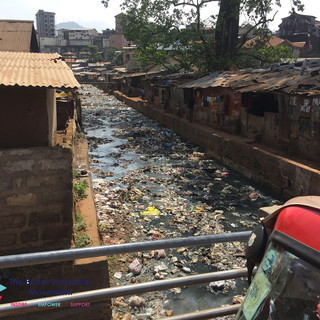The world produces more than 300 million tonnes of plastic every year, including billions of plastic bottles, and five billion plastic bags; half of which we’ll use just once, and then throw away, concentrating in huge swans in the mist of global currents; breaking down into smaller pieces, ingested by species across the marine world, and sinking to the bottom of the sea. The problem is that today only a fraction of the plastic that we produce is recycled, the rest is out in the environment, and it is infested in our lands and our oceans like a disease.

Saidu Turay, a community volunteer for Voluntary Service Overseas (VSO) who resides in Kroo Bay community; a slum in Sierra Leone housing over 10 thousand inhabitants, mobilized members of his community to remove plastic from their river, to mitigate the adverse effect of contamination, and diseases ensued from toxic environments.
The slum has been over populated within 2 decades due to migration from the provinces to have better jobs, and the increasing demand on housing in Freetown. Rubbish in drains from other parts of Freetown, eventually finds its way to these slums; causing diseases and destruction of property when the water stagnates.
Saidu has been involved in disaster management in his community; working with Office of National Security (ONS): disaster management department, as a community stakeholder, and has been volunteering in all the slums that they work in and has organized community clean-ups, removing litter from Kroo Bay’s river. ONS partnering with VSO made it possible for him to gain relevant training on disaster risk reduction and resilience, and enabled him to understand that community involvement is a crucial aspect of any project, program, or intervention.
Since then, he’s been bringing his and other communities together; making them understand that they are also a factor to the problem, and could contribute to reducing plastic pollution. Once they understand and accept that; they can proffer solutions to the problem. He teaches the community about the different kinds of disaster: natural and manmade, and how these hazards could be reduced in their area; during awareness meetings, and when he uses his mega phone to encourage regular community cleaning.
Kroo bay being renowned for disaster; including floods; made them to have been, and are constantly involve in advocacy campaigns as a cry for help and to gain attention; in order to help people understand that their rubbish should be properly disposed of, and not thrown in drainages, and gutters. Doing so will not only ease the flow of stagnated water in drainages, but will reduce the plastic pollution at their crocodile river and other coastal slumps.
As a result of scarce resources, and limited infrastructure, they have been involved in short term solutions to mitigating plastic pollutions; bimonthly cleaning of the rubbish swarmed into their environment from other parts of the city, advocacy campaigns and community awareness.
Due to the lack of enough shovels, rakes, and other cleaning tools, they usually improvise by using sticks, and tools borrowed from neighbouring communities, in addition to their own; during the cleaning process. The garbage is pushed out of river by inhabitants, gathered in the street, and later transported to the national dumpsite.
He expressed that it doesn’t matter whether he lives in a slum or not, as there are others whom, despite living in a scarcely populated environment, still live amidst rubbish, share their toilet with more people, and are more susceptible to malaria and diseases ensued from unsanitary living; making it prudent for all to inculcate habitual practices of cleanliness and proper waste disposal, in order to promote a healthy environment and contribute to the reduction of plastic pollution.










